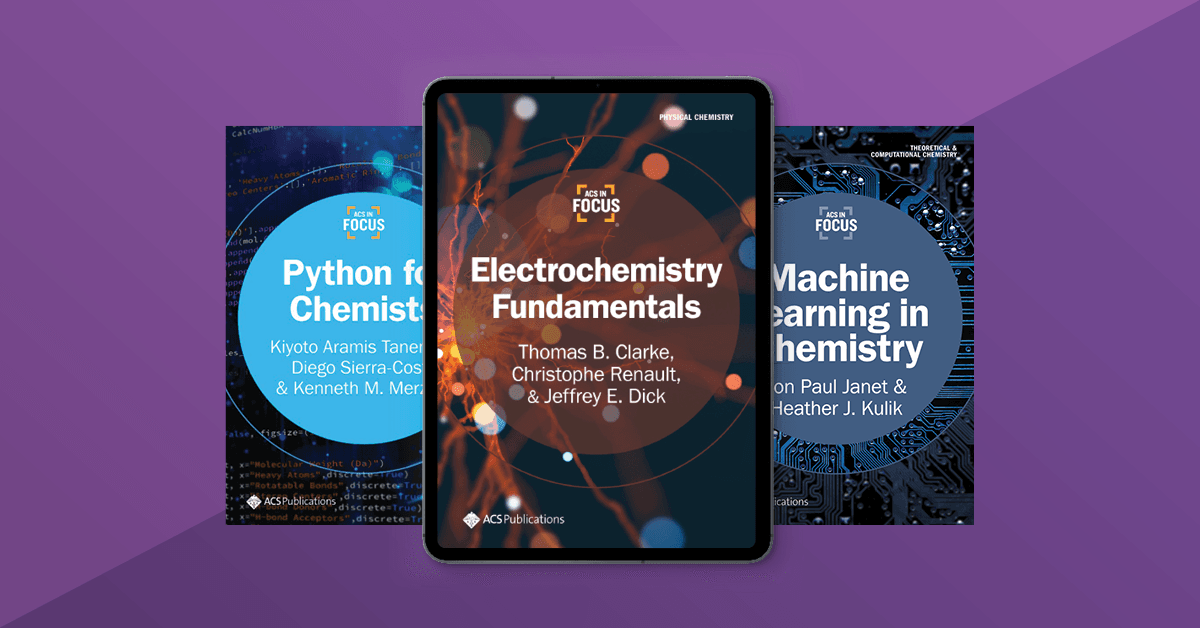Learn how the ACS In Focus series helps researchers of all levels get up to speed quickly on trending research topics, and explore success stories and insights shared by our authors and reviewers.

Conventional technical or scientific publication formats such as review articles and textbooks pose challenges as teaching resources in the digital age. Researchers often struggle to digest new concepts presented in lengthy, text- and jargon-heavy formats, particularly when the goal is to learn complex materials. As scientists work toward cutting-edge discoveries, modern educational content must keep apace in both topic and format.
Efficient Learning
With the expertise in scientific publishing and the drive to accelerate research innovation, ACS Publications has reimagined the publication status quo with ACS In Focus. These digital primers facilitate effective learning through interactive features such as pop-up glossaries and videos. They also include easy navigation links to both internal content and external resources, enabling learners to achieve speed and depth in grasping new concepts and applications.
Expertly Authored Content on Emerging Technologies
ACS In Focus titles cover a broad range of important topics including AI and machine learning, energy and sustainability, materials sciences, medicine and drug discovery, and beyond. ACS Publications partners with authors and reviewers across relevant specialties, producing digital primers with expert-authored and peer-reviewed content in learner-friendly formats that span the gap between conventional textbooks and scholarly journal articles.
ACS In Focus From the Author’s Perspective
The primer makes it easy for interested readers to quickly and easily gain an understanding of key concepts about the topic in just a few hours of reading.
In an interview, Joshua Shutter, co-author of the ACS In Focus digital primer Biosphere-Atmosphere Interactions, highlights a common challenge faced by researchers who are entering or exploring a new field of study. There is a lack of rapid and efficient ways to learn new information applicable to scientific work. Searching for relevant learning materials often involves sifting through numerous complex articles to extract the relevant information.
“I wanted to create a resource for researchers studying biosphere-atmosphere interactions. Before the Biosphere-Atmosphere Interactions primer was written, one would first have to scour the literature for review articles and related resources on the subject,” Shutter says. “Not only is this time consuming, but important concepts may also be overlooked because the individual may not necessarily know what is relevant or how concepts are interrelated.” ACS In Focus digital primers remedy this by synthesizing information from a variety of sources to reduce the barrier to entry on a given topic.

Unlike conventional publications, ACS In Focus digital primers allow authors to effectively communicate complex topics through a range of media, including engaging visuals and interactive elements. While writing Biosphere-Atmosphere Interactions, Shutter prioritized the essential information that a scientist should know when first starting their work, and incorporated multimedia content to ensure fast learning. “The elements that were important for me to include from an educational perspective were strategically placed graphics and video that would help reinforce key concepts in the text,” Shutter explains. “Additionally, I think the 'Read These Next' resources at the end of each section are extremely important. These direct an interested reader to recommended content that will deepen their understanding even more.”
“In general, I think the ACS In Focus digital primers fill a gap between textbooks and review articles. In the case of Biosphere-Atmosphere Interactions, it goes more in-depth on the topic than a general textbook on atmospheric chemistry," he notes. "The primer makes it easy for interested readers to quickly and easily gain an understanding of key concepts about the topic in just a few hours of reading. The ACS In Focus format is unique in that it has video elements that are simply not possible in a printed book...When placed strategically alongside the text, I think these unique elements help to increase reader comprehension.”
ACS In Focus From the Reviewer’s Perspective
Resources that teach you everything, starting from the basics, are very difficult to find...so having a primer like this is excellent.
Synthetic inorganic chemist Alfredo Angeles-Boza, a reviewer for the ACS In Focus digital primer Harnessing Microbial Peptides for Drug Discovery, describes another common struggle for researchers seeking expert-written resources. Many scholarly articles demand a strong grasp of the subject matter, creating a barrier for readers who are new to the topic.
“Resources that teach you everything, starting from the basics, are very difficult to find,” says Angeles-Boza. “Over my 12 years as a professor, most of my graduate students have been chemists with little background in biology—just like me when I started—so having a primer like this is excellent.”
Angeles-Boza was also drawn to the ACS In Focus digital primer's unique quick- read format, accessible language, and topic breadth. "The format is really cool, and it is suitable as a quick read. Nowadays, it is very difficult to focus, sit down, and read a 200-page review. I cannot even do that anymore, so I am not going to ask my students to do it," he says. "Another element that I like are the sections called 'That’s A Wrap' and 'Read This Next.' 'That’s A Wrap' includes the important points of the book, and 'Read This Next' takes readers to a longer, in-depth review into any of the topics that caught their interest, and I found that really helpful.”

Angeles-Boza has already used the Harnessing Microbial Peptides for Drug Discovery ACS In Focus digital primer as a learning resource in his laboratory, providing it to trainees who have recently begun research under his supervision. For instance, one graduate student in his laboratory is a chemist whose research focuses on NMR characterization of peptides.
“She has done hardcore chemistry such as peptide synthesis and has performed NMR, but she is not working with bioassays yet and she does not know much about them,” Angeles-Boza explains. “This resource has been good for her; I think it is helping her prepare and understand the biological context of the peptide of interest and how it will work when secreted.”
Breaking Through Learning Barriers
Through unique formats and expert insights, the ACS In Focus series helps researchers of all levels accelerate their fundamental understanding of new topics. These three- to five-hour reads are written and reviewed by specialists in non-specialist language, and delivered through an e-reader platform. They are easy to digest and provide researchers with a convenient and trustworthy way to expand their skills in unfamiliar areas across scientific fields.